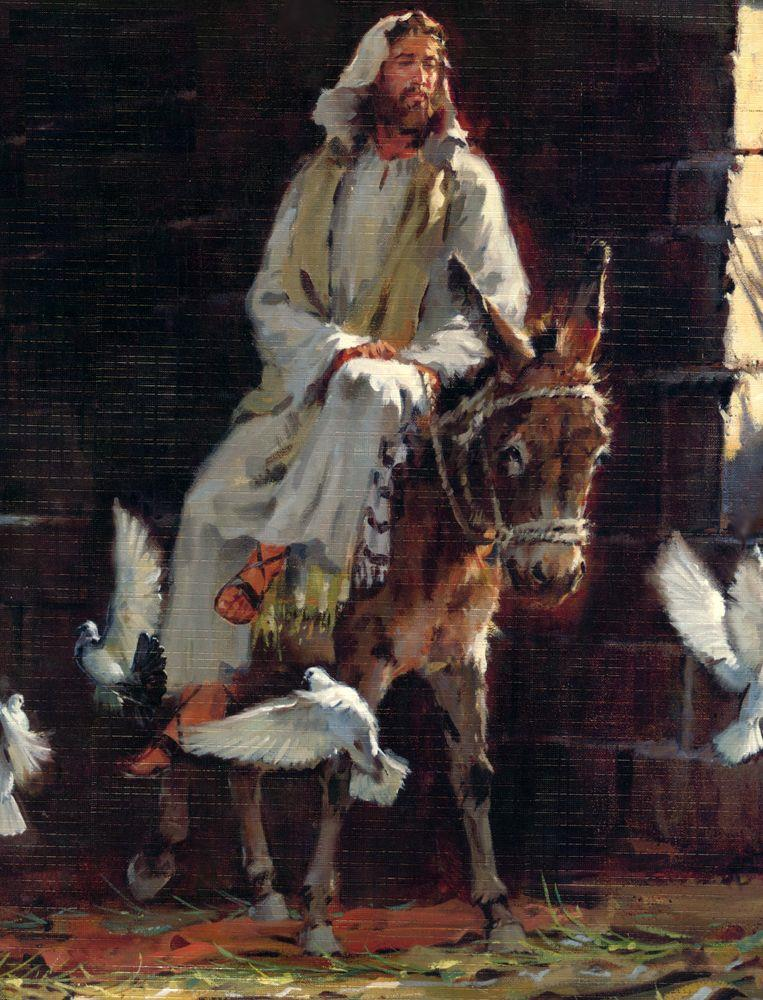Luke 18‒19
Jesus’ Triumphal Entry into Jerusalem
Luke 19
28 And
when He had said these things, He went before, going up to Jerusalem.
29 And it came to pass, as He was near to Bethphage6 and Bethany, at the mountain
called the Mount of Olives, He sent two of His disciples,
30 saying, Go ye into the village opposite, in which on going in you shall find a colt tied,
on which no man ever sat; loose him, and bring him.
31 And if anyone asks you, Why do you loose him? thus you shall say to him, Because the
Lord has need of him.
32 And they who were sent went, and found it even as He had said to them.
33 But as they were loosing the colt, his owners said to them, Why do you loose the colt?
34 And they said, The Lord has need of him.
35 And they brought him to Jesus; and throwing their own garments on the colt, they set
Jesus on him.
36 And as He went, they spread their garments in the way.
37 And when He was already near to the descent of the Mount of Olives, all the
multitude of the disciples rejoicing began to praise God with a great voice for all the
works of power that they had seen,
38 saying, Blessed be the King who comes in the name of the Lord!7 Peace in heaven, and
glory in the highest!
39 And some of the Pharisees from among the crowd said to Him, Teacher, rebuke Thy
disciples!
40 And He answering told them, I say to you, If these should be silent, the stones would
cry out.
AC 2781:8-9. To “ride upon a donkey” was a sign that the natural was made subordinate; and to “ride upon a colt the son of a female donkey” was a sign that the rational was made subordinate.... Because of this signification, and because it belonged to the highest judge and to a king to ride upon them, and at the same time so that the representatives of the church might be fulfilled, it pleased the Lord to do this.... The reason for the representation was that the natural man ought to serve the rational, and this the spiritual, this the celestial, and this the Lord: such is the order of subordination.
AE 31:7. One who does not know the signification of ... “a donkey’s colt,” in a representative sense, will suppose that the Lord’s riding upon a donkey’s colt was significative of misery and humiliation. But it signified royal magnificence; for this reason the people then proclaimed the Lord king, and strewed their garments upon the way. This was done when He went to Jerusalem, because by “Jerusalem” is signified the church... and “garments” signify truths clothing and serving good....
AE 1210. “To praise God” signifies confession and worship, because the Lord has no wish to be praised and glorified from any love of Himself, but only from His love for man, for man cannot help but praise and glorify the Lord, that is, give praise and glory to Him, when he acknowledges in heart that there is nothing of good in himself, and that he can do nothing of himself, and on the other hand, that all good is from the Lord, and that the Lord can do all things. When man is in this acknowledgment, he puts aside what is his own [proprium] , which belongs to the love of self, and opens all things of his mind, and thus gives room for the Divine to flow in with good and with power. This is why it is necessary for man to be in humility before the Lord, and why humility can be from no other source than self-acknowledgment and acknowledgment of the Lord. According to this acknowledgment, reception takes place.
6 Pronounced BETH-fuh-gee, meaning house of young figs; Bethany means house of dates.
7 Psalms 118:26; “Lord” means Jehovah.
Questions and Comments
- Notice where the Lord was coming from in His triumphal entry: the Mount of Olives, which signifies His Divine Love. The story mentions olives, dates and figs, meaning love, wisdom and use.
- What does the Lord need of us? How can we loan Him a donkey?
- The Lord came to enable us to establish the right order of subordination in ourselves, from the natural to the rational, to the spiritual, to the celestial, and to Him. What might be an example of this subordination?
- The theme of humility and subordination to the Lord continues, from the wealthy young ruler, to the story of Zacchaeus, to the multitude of disciples praising God. Learning to humble ourselves takes time. How do we cultivate genuine humility before the Lord, so that He can truly be our King?
| previous |  |
next |
|---|


